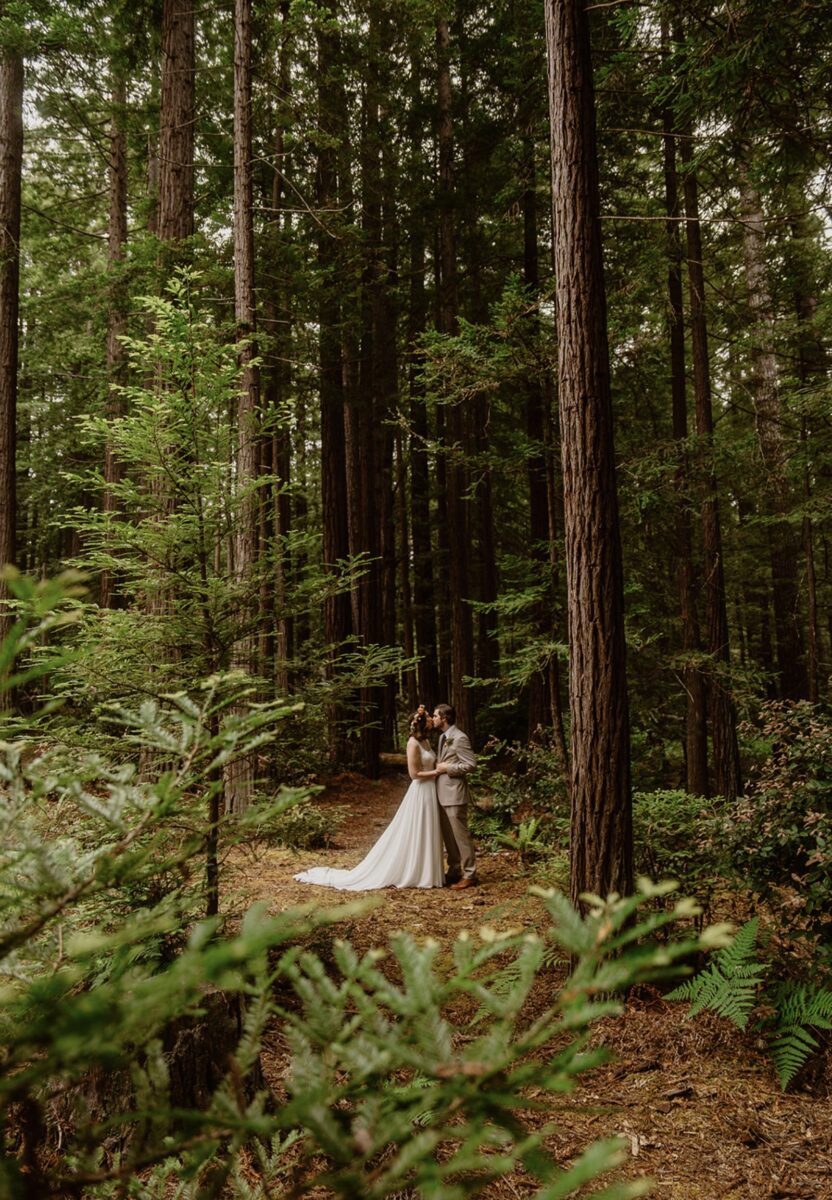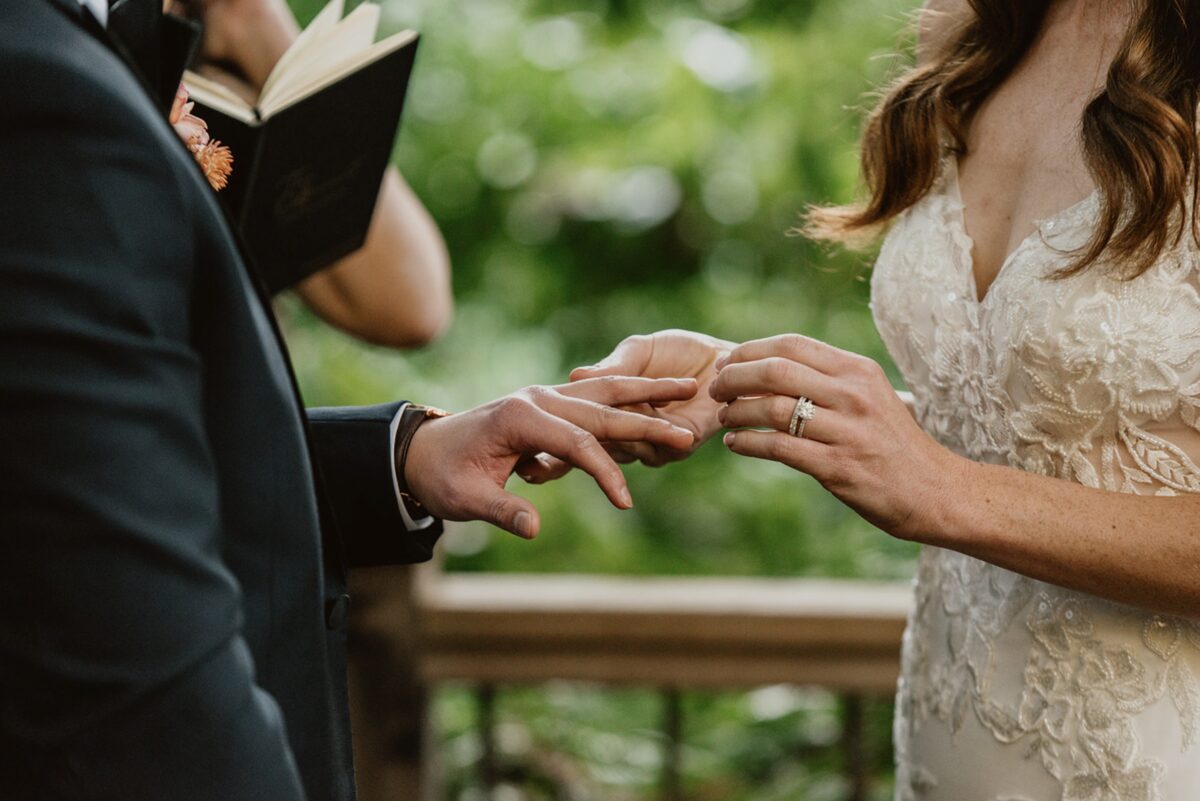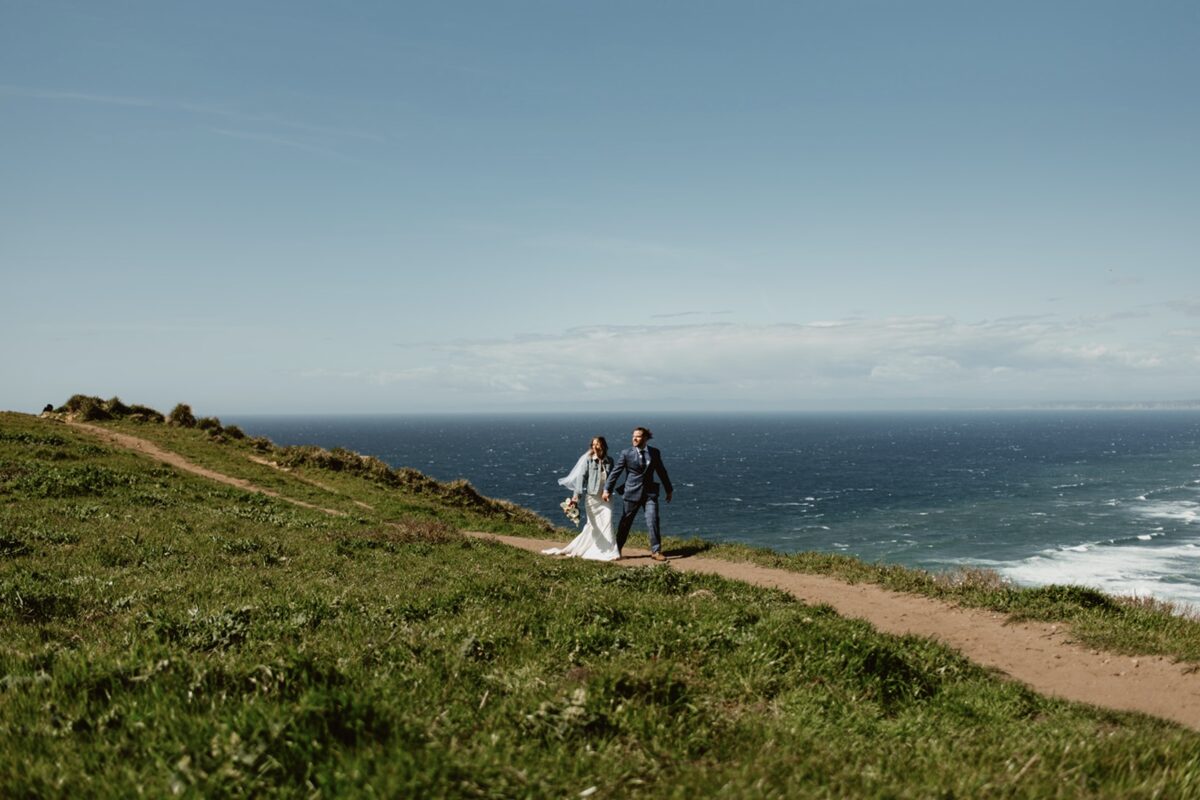The best elopement vows aren’t fancy—they’re honest. Grounded in who you actually are, what you genuinely love about each other, and what this moment means to you. Not what Pinterest says you should feel.
So if your stomach turns at the idea of saying something like “You complete me,” or you feel like you’re going to disappoint someone if your vows aren’t perfectly polished, go ahead and let out a breath. This post is for you.
Let’s talk about how to write meaningful elopement vows that feel like you.
How Elopement Vows Differ from Traditional Wedding Vows
Unlike traditional wedding vows that often feel like a performance for guests, elopement vows get to be just for you two.
That’s the gift of doing things differently. Your ceremony can be just the two of you (and maybe your dog, your best friend, or the trees), so your vows don’t need to follow a script. They just need to be true.
Unlike a traditional wedding, where vows can sometimes feel like one more script to memorize or one more box to check, elopement vows slow you down. They don’t require choreography or applause; they ask for presence. Whether you’re standing at the edge of a cliff or in your backyard, this moment becomes a pause—one where the words you speak aren’t just heard, but felt. There’s space here: for honesty, imperfection, and your truth.
Whether you read them aloud to each other during the ceremony, speak them in private, or write them down for a future date, elopement vows offer space to slow down, speak from the heart, and create an intentional wedding ceremony that’s true to your values.

How to Start Writing Your Elopement Vows: Prompts That Work
Start with reflection, not pressure. Instead of trying to write “the perfect thing,” give yourself permission to write something real. Here are a few gentle prompts to guide you:
- When did you know you wanted to marry this person?
- What do they do that makes your life better?
- What’s a moment with them that still makes you smile?
- What do you want to promise them—not just today, but in the daily, ordinary, future-you life?
- What do you hope to remember about this chapter of your relationship?
You don’t have to answer every question; these are just meant to get you started. Let one lead you somewhere unexpected. Start messy. Let it be a conversation with yourself before it becomes a promise to them.
Elopement Vow Writing Dos and Don’ts
✅ DO:
- Write like you talk
- Include specific details—like how they make your coffee or the way they sing in the car (the ‘weird’ stuff is usually the most meaningful because it’s unique to your relationship)
- Speak from the present and the future
- Keep it simple if that’s your vibe
- Let it be vulnerable (this is not a press release)
❌ DON’T:
- Try to impress anyone (not even your partner)
- Over-rely on jokes or inside references (unless they’re anchoring something real)
- Stress about how long or short it is
- Copy someone else’s vows from Pinterest (unless it’s to figure out what not to say)
How to Write Authentic Elopement Vows That Sound Like You
You don’t need to go out of your way to be poetic, funny, stoic, or dramatic. You just need to be honest. If you’re light-hearted as a couple, lean into that. If you’re spiritual or grounded in nature, let that language in. If you’re sentimental but shy about it, say so in your vows. That meta-honesty is often the most moving part.
Still unsure? Read them out loud to yourself (alone) and listen to how they land. If it makes you tear up or smile like a goof, you’re on the right track.

Elopement Vow Examples: Real vs. Generic Wedding Language
Sometimes the best way to understand authentic vows is to see the difference between generic “wedding language” and real, personal promises. Here are some examples:
Instead of: “I promise to love you forever”
Try: “I promise to keep choosing you, especially on the days when we’re both cranky and the dishes are piling up”
Instead of: “You are my soulmate and better half”
Try: “You’re the person who remembers I hate cilantro and always checks the menu for me”
Instead of: “I can’t imagine life without you”
Try: “I don’t want to do life without your terrible dad jokes and the way you sing off-key in the shower”
Instead of: “You make me a better person”
Try: “You make me braver—like when you convinced me to try that ridiculous hike that became one of our best days”
Instead of: “I promise to support your dreams”
Try: “I promise to celebrate your wins, remind you how capable you are when you doubt yourself, and bring you snacks during your late-night work sessions”
Instead of: “Together we can conquer anything”
Try: “I want to tackle everything with you—from figuring out our taxes to planning adventures that scare us a little”
The difference? The generic versions could apply to anyone. The specific versions could only apply to your relationship. That’s the point: the details that make your love story uniquely yours.
What’s something your partner does that no one else would think to mention? What’s a moment between you that still makes you smile? Those details are your vow material.
When to Write Your Elopement Vows: Timeline and Tips
There’s no perfect timeline for writing your elopement vows, but here’s what I recommend: start at least 4-6 weeks (or more, depending on your style) before your elopement. Write a rough draft, let it sit, voice memo some ideas, then revisit and refine. This gives you time to process without pressure.
Above all, avoid leaving it until the night before—last-minute stress often leads to writer’s block and vows that feel forced.
Should You Read Vows Aloud or Keep Them Private During Your Elopement?
There’s no right answer—just what feels right for you.
Some couples read their vows aloud during the ceremony. Others share them privately beforehand, after, or not at all. Some write them in vow books and exchange them like love letters. If you’re nervous about public emotion or just want to keep things sacred between you, a private vow exchange is a beautiful option.
The Morning-Of Ritual That Changes Everything
One of my favorite recommendations? Transcribe your vows by hand the morning of your elopement, sitting side by side without peeking at each other’s words. It becomes a grounding ritual that makes the promises feel even more real.


How to Handle Emotions When Reading Your Elopement Vows
The short answer: let your feelings happen.
Elopement days are intimate and emotional by nature. If you cry through your vows, that’s not a mistake; it’s proof you meant every word. Emotion isn’t something to manage—it’s something to honor.
Emotions don’t need to be tidied up or hidden, and the best ones aren’t. Let your true feelings come through.
A few grounding tips:
- Take a deep breath before you begin
- Hold hands if you want to
- Look up at your partner as you read, not at your paper the whole time
- Pause when you need to—there’s no rush
- Remember: you’re not performing for anyone. You’re making promises to your person.
Common Questions About Writing Elopement Vows
Q: Should we write our vows together or separately?
You can write them together—but most couples prefer to write them individually, even if they agree on a shared tone, length, and/or format. It keeps the emotional impact fresh.
Q: How long should elopement vows be?
There’s no perfect length. Most couples land somewhere between 2–4 minutes when read aloud, but the beauty of eloping is that you don’t have to worry about time constraints—so focus more on what you’re saying, rather than how long it takes to do so.
Q: Should we practice reading them out loud beforehand?
Yes, but just to yourself. Reading aloud helps you catch awkward phrasing and gives you a sense of timing. It also helps you prepare emotionally for any parts that might make you tear up.
Q: Do we need to memorize them?
Nope! You’re allowed to read them. From your phone, from paper, from a vow book—whatever feels most comfortable.
Q: What if I feel awkward writing my wedding vows?
Try not to overthink it. Write a letter. Free-write in a journal. Record a voice memo. Then shape it later. The words don’t have to be fancy; they just need to be yours.

Ask Meg: Real Questions From Real Couples
“What do we do if we’re both nervous we’ll cry too much?”
Then you’ll cry. And that’s okay. Bring tissues and laugh through the tears. It’s not a disruption—it’s the whole point.
“Is it weird to keep our vows private, even during the ceremony?”
Not weird at all. You get to protect what feels personal. You could even write two sets—public and private. Or let the ceremony be vow-free and share them later at sunset. You get to make the rules!
Your vows don’t need to be perfect—they just need to be honest. If you’re still feeling stuck or want more support as you plan your elopement, I’m here to help you create a day that feels as authentic as the promises you’ll make.
If you want more support for your elopement planning journey, my blog directory is full of emotional guidance, logistical clarity, and permission slips galore—designed to help you feel more present, more prepared, and more like you every step of the way.
Ready to start planning an elopement that feels completely like you? Let’s talk about bringing your vision to life.